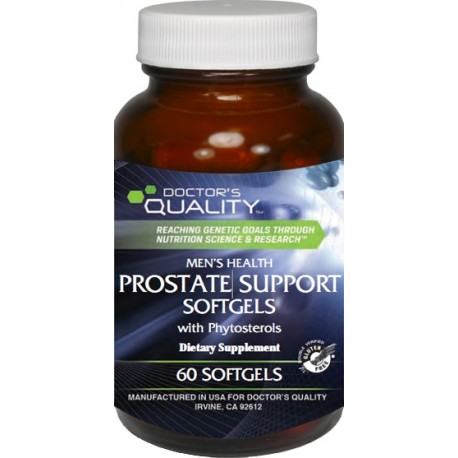No products
Prostate Support Softgels
New product
Prostate Support Softgels has the following benefits:
- Promotes healthy circulation
- Provides antioxidant protection
- Promotes healthy prostate function
200 Items
More info
Indications
Prostate Support Softgels has the following benefits:
- Promotes healthy circulation
- Provides antioxidant protection
- Promotes healthy prostate function
Prostate Health Background & Application
As a normal part of aging, the prostate gland swells in size and may result in signs and symptoms of Benign Prostatic Hypertrophy (BPH). Certain nutrients influence the growth and blood flow to the prostate.
Research Summaries
Pumpkin Seed Oil
Pumpkin seeds contain large amounts of long chain fatty acids and phytochemicals that have been shown to aid in prostate health. The German Commission E has approved Pumpkin Seed Oil for problems of Stage 1 or 2 levels of BPH. It also shows anti-androgenic and anti-inflammatory effects. Subjects in one study showed a decline in dihydrotestosterone levels in prostatic tissue when using pumpkin seed and saw palmetto1. Another study showed a reduction in symptoms in patients with BPH given pumpkin seed oil2.
Saw Palmetto, Nettle & Pygeum
Saw Palmetto has been extensively researched for its role in BPH and prostate cancer. A recent study published in Endocrinology showed Saw Palmetto inhibited IGF-1 signaling pathway thereby mediating antiproliferative effects on prostate cells3. Nettle, too, exhibits an antiproliferative effect in human prostate cancer development4. Pygeum has also shown this effect5 in both BPH and prostate cancer cells.
Lycopene
Lycopene may exert chemoprotective effects through hormone modulation, carcinogen metabolism, and immune system function. Research links it to reductions in skin, breast, prostate, digestive tract, cervix and bladder cancer risk. Research has shown that lycopene supplementation with 15 mg of the substance reduced the growth of prostate cancer in men newly diagnosed with the disease6. Additional research demonstrates that lycopene appears to interfere with IGF-I receptor signaling and cell cycle progression in mammary cancer cells7.
Selenium
A 2005 study in Neoplasma showed that low serum selenium concentrations were observed in both BPH and prostate cancer patients compared with healthy controls8.
Our Product
Our product contains 1200 mg Pumpkin Seed Oil, 300 mg Saw Palmetto, 150 mg Nettle, 100 mg Pygeum, 100 mg phytosterols (including beta-sitosterol), 100 mg green tea extract, 50 mg soy isoflavones, 30 mg Lycopene, and 30 IU vitamin E, 15 mg zinc, and 70 mcg selenium.
Dosage
Take one softgel twice daily.
Specifications
Product Name: Prostate Support Softgels
Label Claim: Supports Prostate Health
How Supplied: Softgel capsule
Product Code: VL154
References
- The Physician’s Desk Reference for Herbal Medicines, 2004. Medical Economics Company, Inc. Montvale, NJ.
- Carbin, B.E., B. Larsson, O. Lindahl. 1990. Treatment of benign prostatic hyperplasia with phytosterols. Br J Urol 66(6):639–641.
- Wadsworth TL, et al. Saw Palmetto Extract Suppresses Insulin-Like Growth Factor-I Signaling and Induces Stress-Activated Protein Kinase/c-Jun N-Terminal Kinase Phosphorylation in Human Prostate Epithelial Cells. 2004, Endocrinology Vol. 145, No. 7 3205-3214
- Konrad L, et al. Antiproliferative effect on human prostate cancer cells by a stinging nettle root (Urtica dioica) extract. Planta Med. 2000 Feb;66(1):44-7.
- Santa Maria Margalef A, et al. Antimitogenic effect of Pygeum africanum extracts on human prostatic cancer cell lines and explants from benign prostatic hyperplasia. Arch Esp Urol. 2003 May;56(4):369-78.
- Omer K, et al. Phase II randomized Clinical Trial of Lycopene Supplementation before Radical Prostatectomy. Cancer Epidemiology, Biomarkers & Prevention, Vol.10,861-868, August 2001.
- Karas M. Lycopene interferes with cell cycle progression and insulin-like growth factor I signaling in mammary cancer cells. Nutr Cancer, 2000;36(1):101-111.
- Zachara BA, et al. Blood and tissue selenium concentrations and glutathione peroxidase activities in patients with prostate cancer and benign prostate hyperplasia. Neoplasma. 2005;52(3):248-54.




